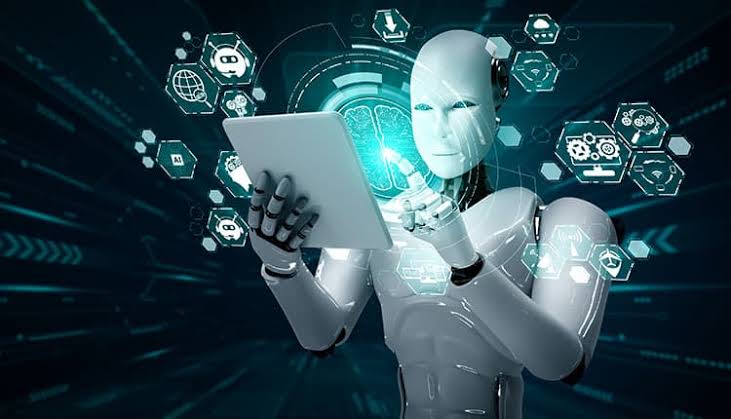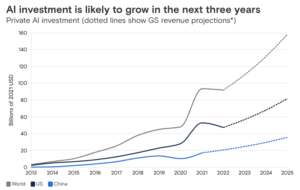
Goldman Sachs, AI’s Potential Impact on US Economy
According to economists at investment banking behemoth Goldman Sachs, artificial intelligence could eventually have a greater economic impact on the United States than electricity and personal computers.
Goldman Sachs economists Joseph Briggs and Devesh Kodnani predicted in an investment report published on August 1 that artificial intelligence (AI) could attract up to $200 billion in global investments by 2025, with half of that in the United States, thereby bolstering its gross domestic product (GDP).

Projection of AI investment growth globally and in the U.S., China over next three years. Source: Goldman Sachs
Goldman Sachs economists estimated that AI could account for up to 4% of GDP in the United States and 2.5% of GDP in other nations that have already begun investing significantly in the technology.
“Generative AI has enormous economic potential and could boost global labor productivity by more than 1 percentage point a year in the decade following widespread usage.”
During previous tech booms sparked by the introduction of electricity and personal computers, the GDP grew by 2%. Goldman attributed a significant portion of the anticipated gains to the accelerated advancements in generative AI.
OpenAI’s chatbot ChatGPT is the most notable example of generative AI technology, but the subsector also includes image creation software Midourney and text-to-speech generator Eleven Labs.
Nonetheless, these productive benefits of generative AI come with a price, namely that businesses will need to invest significantly and quickly.
The report states, “For large-scale transformation to occur, businesses will need to make substantial initial investments in physical, digital, and human capital to acquire and implement new technologies and reshape business processes.” 16% of Russell 3000 companies mentioned AI during earnings conversations, according to Goldman.
“The U.S., meanwhile, is positioned as the market leader in AI technology, and American companies will likely be relatively early adopters.”
Considering this figure is up substantially from less than 1% in 2016, the bank stated that this places the United States at the forefront of AI innovation.
The economists noted that, although the timetable of the AI investment cycle is difficult to predict, current business surveys indicate that AI will have its greatest investment impact after 2025.
